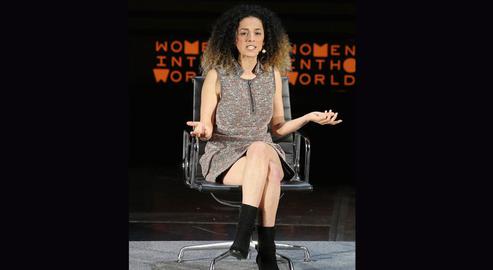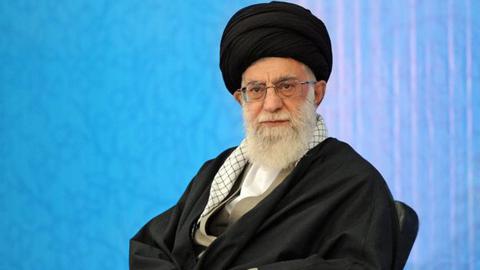In this series on self-censorship, we asked writers, artists, journalists and human rights activists to define self-censorship. Where possible, they are invited to give examples of their experiences, and to describe what they have witnessed.
We presented each interviewee with the same set of questions, adapting them or asking further questions where relevant.
Our intention was for the interviewees to express their own perspective of self-censorship.
***
Masih Alinejad is the founder of the My Stealthy Freedom Facebook page, which champions women’s right to not to wear the Islamic headscarf. The campaign has been a constant irritant for the Islamic Republic of Iran — in particular, those authorities who see themselves as guardians of the hijab and overseers of moral conduct in society.
As My Stealthy Freedom has built its audience, it has also turned into an outlet for Iranian citizen journalists, who have used it to publicize news and events — such as acid attacks against women in Isfahan — that Iranian officials prefer to ignore or cover up.
Before leaving Iran for England in fear of imminent arrest, Alinejad was an investigative journalist and a parliamentary reporter. In the aftermath of the disputed 2009 presidential election, while the government was denying that there had been any violence against demonstrators, she was able to document and publish the names of 57 people who were killed during demonstrations.
This is the second part of our three-part interview with Masih Alinejad. Read the first interview.
Some people might argue that your views are a bit biased because you define concepts in terms of gender. You refer to the educational system but most of what you say is about women’s rights, whereas the bad educational system in Iran is equally bad for everybody. Boys receive the same ideologically bad education that girls do. So do you think, because of your years of working as a women’s rights activist — and particularly on the issue of mandatory hijab — you essentially see the world as masculine and feminine?
I have not focused on women because I am active in achieving equal rights for women. We are talking about educational and censorship systems that want to eradicate women’s voice and independence. Even when they censor men it is because of women. Patriarchal and misogynic governments have always used men as tools for oppressing and censoring women.
For instance, if you look at the issue of forced hijab you will undoubtedly find out that it is not a feminine question. The government uses men to force hijab on women. It indoctrinates men to believe that their honor is dependent on the hijab of their wives, their mothers and their sisters. In other words it encourages men to uphold their honor and it is the government that defines what this honor means. It is the government that derives a different meaning from words and concepts, not me or people like me. And they are the ones who use general words and concepts to support discriminatory laws. It is the government that is afraid of women and the government’s censorship is focused on women.
Wherever you go — the legislative, the executive, the judiciary — the presence of women is lackluster. In the Iranian system of government men and women are not equal. A woman cannot become president. A woman cannot be a judge. The number of women in parliament is not comparable to that of men. There is not a single woman in Mr. Rouhani’s cabinet. What do these things tell you? Government’s censorship revolves around women. When a government has such a misogynistic behavior, when it censors women and removes them from public arenas, then the presence of women on the street is both censored and self-censored.
It is not me who sees the society in terms of masculine and feminine. On the contrary, it is to fend off such a point of view that I shout loudly that forced hijab is not a feminine issue but that it also insults the intelligence of men. The fact that women are not allowed into sports stadiums is not only a women’s problem and the issue is much more complex. This is a human issue. These walls and lines of separation are insults to the character and the mind of men.
So how I analyze the situation is a response to what I see in a patriarchal government; otherwise I do not believe that self-censorship is masculine or feminine. I believe that in our society not only women but also men suffer from self-censorship. Many times men have written on the [Facebook] page of the My Stealthy Freedom campaign: “personally we believe in the right to choose hijab or what you wear, but do you see how it is out there? To keep my wife, my sister and my mother safe I ask them to observe hijab until Iran is ready to do otherwise.” What does this mean? It means that men are censoring women in an emotional way. They are yet unaware that their wives, sisters and mothers are able to fend for themselves against violence. They have taught men since childhood that women are weak creatures and as men they must protect them. We are all fellow passengers on the same ship and we all somehow complement each other.
In the first part of our interview you said that censorship and self-censorship in Iran are caused by dictatorship. We can discover the roots of a society’s way of thinking in various eras by studying its classical culture and literature. Put simply, the identity of a nation is its culture. Iran’s classical culture and literature does not agree with your views. Is this because you have not worked professionally in artistic and cultural fields?
To answer this question I must quote a Persian proverb: “Your red tongue can cause your green head to be cut off.” This is not an internal feeling but an expression of fear. Who is the one who cuts off the head? Somebody who cannot tolerate freedom, somebody who cannot tolerate differences of opinion. In such proverbs we can see the fear of an oppressive government. We cannot say that our artists and intellectuals have been self-censoring since they were born. Why artists and intellectuals commit self-censorship in their literary works, their poetry, their films and their cultural products is something that must be critiqued and analyzed.
But for these artists survival is also important. Cultural, political and literary survival is important to them. This must be taken into account, depending on each person’s abilities. One may reject survival at any price and not commit self-censorship. In that case that person either must leave the country or be banned from work or be imprisoned or exiled. So the more we look into it the more we find out that self-censorship starts with an oppressive government whose laws are against freedom of expression. If somebody leaves Islam, he is not permitted to say so and he is considered a heretic.
We are suffering from a systematic censorship and it is even encoded in our laws.
visit the accountability section
In this section of Iran Wire, you can contact the officials and launch your campaign for various problems

























comments